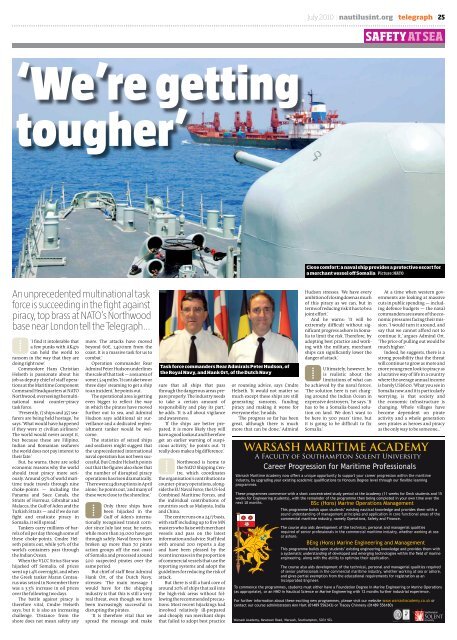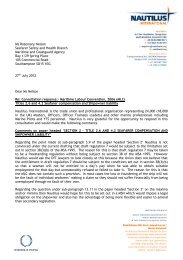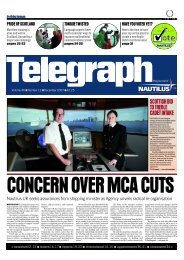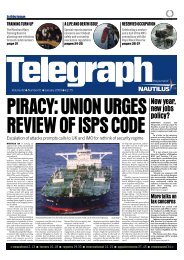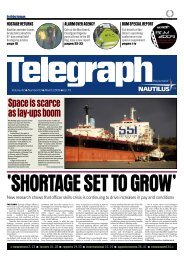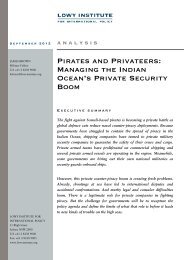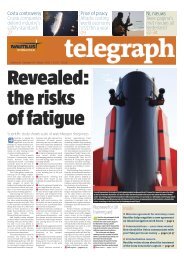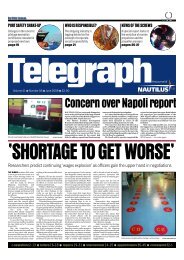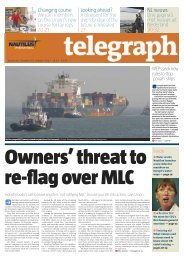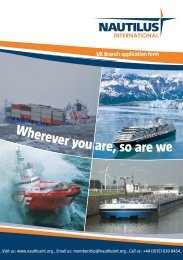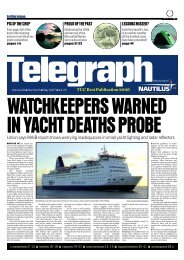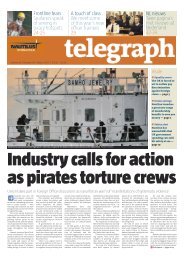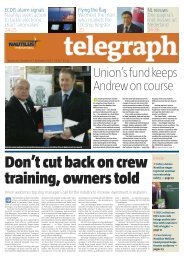Create successful ePaper yourself
Turn your PDF publications into a flip-book with our unique Google optimized e-Paper software.
July 2010 | nautilusint.org | telegraph | 25<br />
SAFETY AT SEA<br />
‘We’re getting<br />
tougher’<br />
Close comfort: a naval ship provides a protective escort for<br />
a merchant vessel off Somalia Picture: NATO<br />
An unprecedented multinational task<br />
force is succeeding in the fight against<br />
piracy, top brass at NATO’s Northwood<br />
base near London tell the Telegraph...<br />
M<br />
‘I find it intolerable that<br />
a few punks with AK47s<br />
can hold the world to<br />
ransom in the way that they are<br />
doing right now.’<br />
Commodore Hans Christian<br />
Helseth is passionate about his<br />
job as deputy chief of staff operations<br />
at the Maritime Component<br />
Command Headquarters at NATO<br />
Northwood, overseeing the multinational<br />
naval counter-piracy<br />
task force.<br />
‘Presently, 17 ships and 357 seafarers<br />
are being held hostage,’ he<br />
says. ‘What would have happened<br />
if they were 17 civilian airliners?<br />
The world would never accept it,<br />
but because these are Filipino,<br />
Indian and Romanian seafarers<br />
the world does not pay interest to<br />
their fate.’<br />
But, he warns, there are solid<br />
economic reasons why the world<br />
should treat piracy more seriously.<br />
‘Around 95% of world maritime<br />
trade travels through nine<br />
choke-points — including the<br />
Panama and Suez Canals, the<br />
Straits of Hormuz, Gibraltar and<br />
Malacca, the Gulf of Aden and the<br />
Turkish Straits — and if we do not<br />
fight and eradicate piracy in<br />
Somalia, it will spread.’<br />
Tankers carry millions of barrels<br />
of oil per day through some of<br />
these choke-points, Cmdre Helseth<br />
points out, while 50% of the<br />
world’s containers pass through<br />
the Indian Ocean.<br />
When the VLCC Sirius Star was<br />
hijacked off Somalia, oil prices<br />
went up 1.4% overnight, and when<br />
the Greek tanker Maran Centaurus<br />
was seized in November there<br />
was a 3.3% increase in oil prices<br />
over the following two days.<br />
The battle against piracy is<br />
therefore vital, Cmdre Helseth<br />
says, but it is also an increasing<br />
challenge. ‘Distance from the<br />
shore does not mean safety any<br />
more. The attacks have moved<br />
beyond 60E, 1,400nm from the<br />
coast. It is a massive task for us to<br />
combat.’<br />
Operation commander Rear<br />
Admiral Peter Hudson underlines<br />
the scale of that task — a sea area of<br />
some 1.5 sq miles. ‘It can take two or<br />
three days’ steaming to get a ship<br />
to an incident,’ he points out.<br />
The operational area is getting<br />
even bigger to reflect the way<br />
in which the pirates have moved<br />
further out to sea, and Admiral<br />
Hudson says additional air surveillance<br />
and a dedicated replenishment<br />
tanker would be welcome.<br />
The statistics of seized ships<br />
and seafarers might suggest that<br />
the unprecedented international<br />
naval operation has not been successful.<br />
But Cmdre Helseth points<br />
out that the figures also show that<br />
the number of disrupted piracy<br />
operations has risen dramatically.<br />
‘There were 24 disruptions in April<br />
alone,’ he points out, ‘and many of<br />
these were close to the shoreline.’<br />
M<br />
Only three ships have<br />
been hijacked in the<br />
Gulf of Aden’s internationally<br />
recognised transit corridor<br />
since July last year, he notes,<br />
while more than 29,000 have got<br />
through safely. Naval forces have<br />
broken up more than 70 pirate<br />
action groups off the east coast<br />
of Somalia and processed around<br />
500 suspected pirates over the<br />
same period.<br />
But chief of staff Rear Admiral<br />
Hank Ort, of the Dutch Navy,<br />
stresses: ‘The main message I<br />
would have for the shipping<br />
industry is that this is still a very<br />
real threat, even though we have<br />
been increasingly successful in<br />
disrupting the pirates.<br />
‘It is therefore vital that we<br />
spread the message and make<br />
Task force commanders Rear Admirals Peter Hudson, of<br />
the Royal Navy, and Hank Ort, of the Dutch Navy<br />
sure that all ships that pass<br />
through the dangerous areas prepare<br />
properly. The industry needs<br />
to take a certain amount of<br />
responsibility and play its part,’<br />
he adds. ‘It is all about vigilance<br />
and awareness.<br />
‘If the ships are better prepared,<br />
it is more likely they will<br />
have a good lookout and therefore<br />
get an earlier warning of suspicious<br />
activity,’ he points out. ‘It<br />
really does make a big difference.’<br />
M<br />
Northwood is home to<br />
the NATO Shipping Centre,<br />
which coordinates<br />
the organisation’s contribution to<br />
counter-piracy operations, alongside<br />
the EU Naval Force, the US-led<br />
Combined Maritime Forces, and<br />
the individual contributions of<br />
countries such as Malaysia, India<br />
and China.<br />
The centre runs on a 24/7 basis,<br />
with staff including up to five MN<br />
masters who liaise with merchant<br />
vessels and pass on the latest<br />
information and advice. Staff deal<br />
with around 200 reports a day<br />
and have been pleased by the<br />
recent increases in the proportion<br />
of commercial vessels that use the<br />
reporting systems and adopt the<br />
guidelines for reducing the risk of<br />
attack.<br />
But there is still a hard core of<br />
around 20% of ships that sail into<br />
the high-risk areas without following<br />
the recommended precautions.<br />
Most recent hijackings had<br />
involved relatively ill-prepared<br />
and cheaply run merchant ships<br />
that failed to adopt best practice<br />
or routeing advice, says Cmdre<br />
Helseth. ‘It would not matter so<br />
much except these ships are still<br />
generating ransoms, funding<br />
piracy and making it worse for<br />
everyone else,’ he adds.<br />
‘The progress so far has been<br />
great, although there is much<br />
more that can be done,’ Admiral<br />
WARSASH MARITIME ACADEMY<br />
A Faculty of Southampton Solent University<br />
Career Progression for Maritime Professionals<br />
Warsash Maritime Academy now offers a unique opportunity to support your career progression within the maritime<br />
<br />
programmes.<br />
<br />
<br />
next 18 months.<br />
<br />
<br />
sound understanding of management principles and application in core functional areas of the<br />
<br />
<br />
required of senior professionals in the commercial maritime industry, whether working at sea<br />
or ashore.<br />
<br />
<br />
<br />
engineering, along with the ability to optimise their application.<br />
<br />
of senior professionals in the commercial maritime industry, whether working at sea or ashore,<br />
<br />
Incorporated Engineer.<br />
<br />
<br />
www.warsashacademy.co.uk or<br />
<br />
<br />
Hudson stresses. ‘We have every<br />
ambition of closing down as much<br />
of this piracy as we can, but in<br />
terms of reducing risk it has to be a<br />
joint effort.’<br />
And he warns: ‘It will be<br />
extremely difficult without significant<br />
progress ashore in Somalia<br />
to limit the risk. Therefore, by<br />
adopting best practice and working<br />
with the military, merchant<br />
ships can significantly lower the<br />
danger of attack.’<br />
M<br />
Ultimately, however, he<br />
is realistic about the<br />
limitations of what can<br />
be achieved by the naval forces.<br />
‘The solution here is not charging<br />
around the Indian Ocean in<br />
expensive destroyers,’ he says. ‘It<br />
has to be a Somalia-based solution<br />
on land. We don’t want to<br />
be here in 300 years’ time, but<br />
it is going to be difficult to fix<br />
Somalia.’<br />
At a time when western governments<br />
are looking at massive<br />
cuts in public spending — including<br />
defence budgets — the naval<br />
commanders are aware of the economic<br />
pressures facing their mission.<br />
‘I would turn it around, and<br />
say that we cannot afford not to<br />
continue it,’ argues Admiral Ort.<br />
‘The price of pulling out would be<br />
much higher.’<br />
Indeed, he suggests, there is a<br />
strong possibility that the threat<br />
will continue to grow as more and<br />
more young men look to piracy as<br />
a lucrative way of life in a country<br />
where the average annual income<br />
is barely US$600. ‘What you see in<br />
Somalia now, and it is particularly<br />
worrying, is that society and<br />
the economic infrastructure is<br />
changing. Whole villages have<br />
become dependent on pirate<br />
activity and a whole generation<br />
sees pirates as heroes and piracy<br />
as the only way to be someone…’


